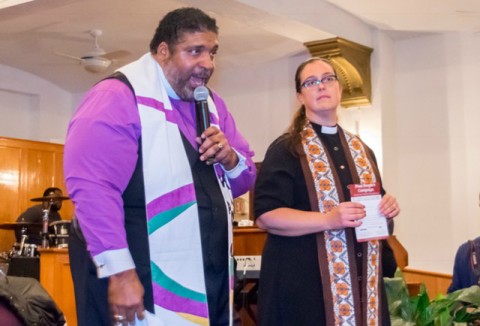William Barber and Liz Theoharis take the Poor People’s Campaign on the road
The campaign is confronting four interlocking issues: systemic racism, poverty, the war economy, and ecological devastation.

William Barber II and Liz Theoharis may be national co-chairs of a new Poor People’s Campaign, but their speaking tour isn’t about their own agenda.
“This is not for the poor, it’s with the poor,” Barber said at an October 12 event in Chicago that included people from across Illinois and Indiana. It was the ninth stop in a 15-city tour.
This year and next are the 50th anniversary of the first Poor People’s Campaign, but “we’re not having a commemoration,” Barber said.
From the pulpit of a Chicago church where Martin Luther King Jr. spoke, Barber noted that King was did not lead the first campaign by himself. That movement involved a diverse group of people, just as the new campaign is working to create a big tent, and has dozens of faith-based, labor, and community groups involved. Joining Barber and Theoharis in the front of the church were an interfaith group of clergy and community leaders.
Barber, a Disciples of Christ (Christian Church) pastor and leader of the Moral Mondays movement, and Theoharis, co-director of the Kairos Center at Union Theological Seminary, offered a platform for people to speak who are affected by four interlocking issues: systemic racism, poverty, the war economy, and ecological devastation.
“The four evils that this campaign is taking on,” Theoharis said, “are wreaking havoc on people’s lives and livelihoods.”
At the center of the event were the testimonies of people from Illinois and Indiana, three of them mothers. An Iraq veteran with posttraumatic stress disorder and traumatic brain injury said he saw the United States facing a choice: either it can ensure a decent standard of living for its own people or it can continue its foreign military involvements, but it can’t do both. A black woman told how she was denied a fair process by child welfare services. A Latina woman spoke of how her son has had breathing problems since they moved into an area where unchecked corporations are polluting the air. And a white woman spoke of working at a job in which after 26 years of employment the maximum wage is $11.05 an hour.
The campaign is calling for six weeks of civil disobedience at the U.S. Capitol and in state capitals starting on Mother’s Day 2018.
Theoharis brought many of the estimated 225 people in attendance to their feet when she asked whether they were ready to join a national movement to shift the moral narrative and conditions in society.
“We are going to change this country and make it what it has not yet been for all of us,” Theoharis said.
Barber, who was wearing a stole that said “Jesus was a poor man,” drew from Luke 4:18–19, using his preferred translation of verse 19, which says Christ came to “proclaim the year of the Lord’s breakthrough.”
“America needs a breakthrough,” he said. While there were many references throughout the evening to President Trump, Barber said the campaign would be calling for a moral revival regardless of who occupied the White House.
“We’re coming together across all kinds of divides,” he said, after having quoted from the Qur’an and emphasizing that the campaign supports women’s rights and LGBTQ rights.
He also spoke to regional differences, and how states in the North are also affected by the issues the campaign is addressing, telling the Midwestern audience with a playful tone not to “be talking about us down South all the time.”
Barber, who became known in North Carolina for fighting voter suppression laws, noted that states with compromised voting rights are also ones with the highest poverty rates, environmental damage, and other problems. These states then elect politicians who vote against the poor and marginalized, he said.
Barber said, “If they are cynical enough to be together, we’d better be smart enough to come together.”
A version of this article, which was edited on October 20, appears in the November 8 print edition under the title “People: William Barber II and Liz Theoharis.”



